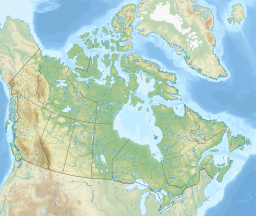Lac la Ronge is a glacial lake in the Canadian province of Saskatchewan. It is the fifth largest lake in the province and is approximately 250 kilometres (160 mi) north of Prince Albert, on the edge of the Canadian Shield. La Ronge, Air Ronge, and the Lac La Ronge First Nation are on the western shore. The lake is a popular vacation spot. Recreational activities include fishing, boating, canoeing, hiking, and camping.[3][4]
| Lac la Ronge | |
|---|---|
 NASA image of Lac la Ronge | |
| Location | Northern Saskatchewan Administration District |
| Coordinates | 55°10′N 105°00′W / 55.167°N 105.000°W |
| Type | Glacial lake |
| Primary inflows |
|
| Primary outflows | Rapid River |
| Catchment area | 10,000 km2 (3,900 sq mi) |
| Basin countries | Canada |
| Surface area | 1,413 km2 (546 sq mi) |
| Average depth | 14.6 m (48 ft) |
| Max. depth | 42.1 m (138 ft) |
| Water volume | 17.6 km3 (14,300,000 acre⋅ft) |
| Shore length1 | 1,015 km (631 mi) |
| Surface elevation | 364 m (1,194 ft) |
| Islands | 1,305 |
| Settlements | |
| References | [1][2] |
| 1 Shore length is not a well-defined measure. | |
Recreation and access
editLac La Ronge Provincial Park[5] extends around the lake on three sides, starting at La Ronge and ending along the east shore.[6] The park contains four RV parks, two of which are on the west shore of the lake, one is in the town of Missinipe (Missinipe is the Woodland Cree name for the Churchill River which is on the south-west shore of Otter Lake, which flows through the north side of the park), and the fourth one is on the east shore of Nemeiben Lake. There is also a hunting and fishing lodge 26 kilometres (16 mi) north of La Ronge. Nistowiak Falls, on the Rapid River, which is the lake's primary outflow into the Churchill River and one of the tallest falls in Saskatchewan can be observed by canoe trails on the north side of the park.
Highway 2 passes the lake on the west side, ending at La Ronge, where it becomes Highway 102. Stanley Mission can be accessed by Highway 915 on the north side of the park. The community is on the shores of the Churchill River across from the Holy Trinity Anglican Church, Saskatchewan's oldest building.
Lac la Ronge Dam
editThe Lac la Ronge Dam (55°20′09″N 104°32′05″W / 55.3358°N 104.5346°W), which is an embankment dam, was constructed at the source of the Rapid River in 1966 to regulate the lake's water levels. It is 3.7 metres (12 ft) high and contains four gates. The dam was upgraded in 2007 and a fish ladder was installed.[7] Further upgrades were undertaken between 2017 and 2022 at a cost of $2.7 million. The upgrades included "strengthening the control structure and adding a modern steel structure over the spillway to install and remove stoplogs, along with seepage remediation".[8]
Island ecology
editThe lake's numerous islands have been the focus of biogeography studies investigating how island size and isolation influence the wildlife inhabiting them.[9] In the northern half of the lake, you'll find over 1,300 ice age-carved granite islands.[10]
Fish species
editThe lake's large bodied fish species include: walleye, yellow perch, northern pike, lake trout, lake whitefish, cisco, white sucker, longnose sucker, and burbot.[11]
Unlike other lakes in Saskatchewan, in addition to a provincial angling licence, a special angling endorsement was required to fish on Lac la Ronge from 1997 until 2017. The Lac la Ronge endorsement allowed anglers to keep up to four lake trout annually from the lake. It was put in place to reduce the harvest from sport fishing after the collapse of the lake trout population within Lac la Ronge. The endorsement was available free of charge from the Ministry of Environment office in La Ronge. Beginning in 2015, the Ministry also required anglers to keep a "Harvest Ledger", which was given alongside the endorsement to record when Lake Trout were harvested. In May 2017 when the 2017–18 fishing season opened the Saskatchewan Ministry of Environment discontinued the endorsement and "Harvest Ledger" requirement.
Lac la Ronge may now be fished with only a provincial angling licence but has reduced limits for lake trout, northern pike and walleye, along with the mandatory use of barbless hooks.[12][13]
See also
editReferences
edit- ^ "Principal lakes, elevation and area, by province and territory". Statistics Canada. 2 February 2005. Retrieved 22 October 2012.
- ^ "World Lake Database (Lakes in Canada)". Archived from the original on 6 March 2016. Retrieved 21 February 2015.
- ^ Francis, Daniel (7 February 2007). "Lac la Ronge". The Canadian Encyclopedia. Retrieved 15 March 2024.
- ^ Lewry, Marilyn. "Lac la Ronge". The Encyclopedia of Saskatchewan. Government of Saskatchewan. Retrieved 15 March 2024.
- ^ "Lac La Ronge Provincial Park". Tourism Saskatchewan. Government of Saskatchewan. Retrieved 15 March 2024.
- ^ "Natural Resources Canada-Canadian Geographical Names (Lac la Ronge)". Retrieved 29 August 2014.
- ^ "Dams and Reservoirs". wsask. Water Security Agency. Retrieved 12 March 2024.
- ^ Cornet, Derek (12 May 2023). "Lac La Ronge below desirable operating range". SaskNow. Pattison Media. Retrieved 15 March 2024.
- ^ Bell, Aaron J.; Phillips, Iain D.; Nielsen, Scott E.; Spence, John R. (2017). "Species traits modify the species-area relationship in ground-beetle (Coleoptera: Carabidae) assemblages on islands in a boreal lake". PLOS ONE. 12 (12): e0190174. Bibcode:2017PLoSO..1290174B. doi:10.1371/journal.pone.0190174. ISSN 1932-6203. PMC 5738139. PMID 29261805.
- ^ "Cottage real estate region: Lac la Ronge". Cottage Life. 16 December 2021. Retrieved 16 December 2021.
- ^ "Lac la Ronge". Angler's Atlas. Retrieved 15 March 2024.
- ^ "Lac la Ronge". SaskLakes. Retrieved 15 March 2024.
- ^ "Lac la Ronge (Marine Chart : CA6281_1)". GPS Nautical Charts. Bist LLC. Retrieved 15 March 2024.
External links
editMedia related to Lac La Ronge at Wikimedia Commons

